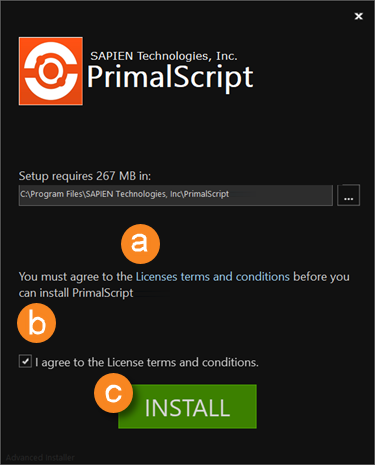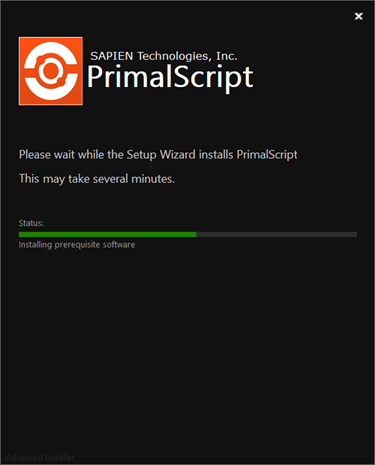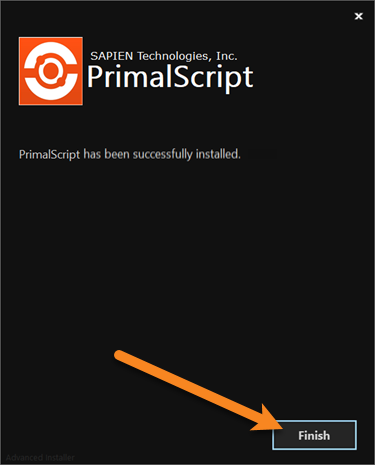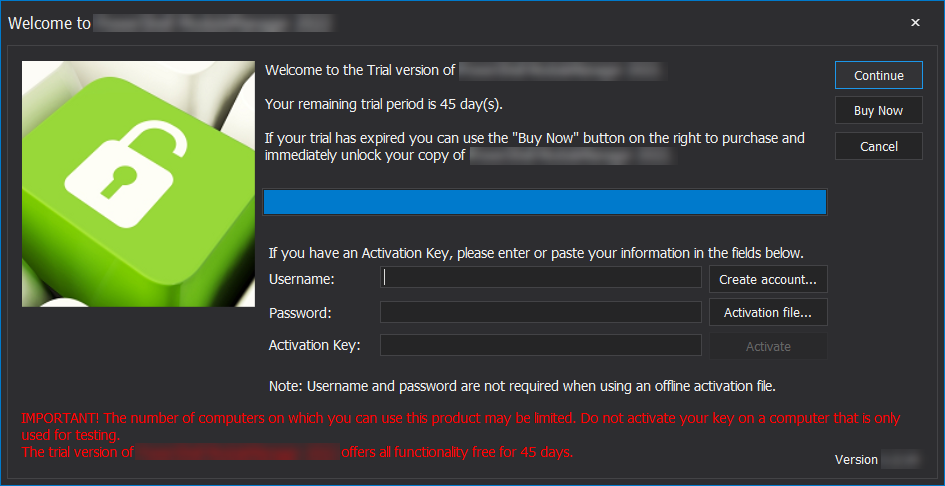To get started using PrimalScript, follow the instructions below to download and install the program. It is also a good idea to review the security and firewall considerations.
Downloading PrimalScript
All SAPIEN Technologies software products are downloadable only. Download registered products from your SAPIEN Account Registered Products page.
Select the 64-bit version of PrimalScript to download. The installer software will save to your default download folder (e.g., PSR23Setup_8.1.184_062123_x64.exe).
 Starting with the PrimalScript 2020 product release, 32-bit versions are no longer available. Current owners of a license that includes a 32-bit product will have access to that from their SAPIEN Account Registered Products page.
Starting with the PrimalScript 2020 product release, 32-bit versions are no longer available. Current owners of a license that includes a 32-bit product will have access to that from their SAPIEN Account Registered Products page.
Want to try before you buy? You can download a trial version here.
Installing PrimalScript
Follow these instructions to install PrimalScript.
How to install PrimalScript
1.In your default download folder, double-click on the downloaded program (e.g., PSR23Setup_8.1.184_062123_x64.exe).
2.Reply Yes to the "Do you want to allow this app to make changes to your device?" prompt.
The installation wizard will first check several items, such as available disk space and the presence of previous builds. If the environment is adequate, the installer will display the legal agreement which you must accept to proceed:
a.Read the terms of the license agreement.
b.Accept the terms of the license agreement. You should never accept license terms unless you have read them, and you understand them.
c.Once you have accepted the terms, click Install.
 The software will install in the default location as shown, unless you change the path.
The software will install in the default location as shown, unless you change the path.

3.The installation may take several minutes.

4.When PrimalScript successfully completes the installation, click Finish.

 To install PrimalScript on Windows 7, Windows Server 2008, and earlier versions of Windows, install PrimalScript by right-clicking the installer package and selecting Run as Administrator. This ensures that PrimalScript installs with the privileges it requires to properly configure advanced components, such as the Remote Script Execution Engine.
To install PrimalScript on Windows 7, Windows Server 2008, and earlier versions of Windows, install PrimalScript by right-clicking the installer package and selecting Run as Administrator. This ensures that PrimalScript installs with the privileges it requires to properly configure advanced components, such as the Remote Script Execution Engine.
 If a previous version of PrimalScript is open, you are prompted to exit. If you don't exit, PrimalScript restarts after the installation is complete.
If a previous version of PrimalScript is open, you are prompted to exit. If you don't exit, PrimalScript restarts after the installation is complete.
Silent Installation
Use this command if you need to install silently:
PSRxxSetup_x.x.xxx_xxxxxx_x64.exe /exenoui /qn
Example:
PRS21Setup_8.0.152_072621_x64.exe /exenoui /qn
Troubleshooting Installation
If you encounter problems installing PrimalScript, please report them in the Installation Issues support forum.
Use these Installer Log parameters to output to a log file: Installer.exe /exenoui /qn /L*v .\PSR_Install.log
Security
You might need Administrator privileges to install PrimalScript if you plan to add local firewall exceptions for the Remote Script Execution Engine or the ASP Debugger.
Other PrimalScript features require the permissions of a member of the Administrators group on the computer, including:
•Enumerating WMI namespaces and classes (for the WMI Explorer and WMI Wizard)
•Debugging scripts
•Changing the Windows PowerShell execution policy (Set-ExecutionPolicy)
•Changing the Windows Script Host trust policy
•Scanning for new command-line tools
•Accessing links in the Info Browser
 This is only a partial list; other features might also require administrative access.
This is only a partial list; other features might also require administrative access.
When running PrimalScript on Windows 7 and earlier versions of Windows, User Account Control (UAC) can prevent some features from installing or running correctly. On these systems, we recommend that you configure PrimalScript to run as administrator.
To run PrimalScript as an administrator (one time)
•Each time you open PrimalScript, right-click the PrimalScript icon or executable and select Run as Administrator.
To run PrimalScript as an administrator (every time)
1.Right-click the PrimalScript icon or executable, and then select Properties.
2.Select the Shortcut tab.
3.Click Advanced.
4.Select the Run as administrator checkbox.
5.Click OK.
When the configuration is complete, Windows displays a UAC warning or an authentication dialog box each time you start PrimalScript.
Firewall Considerations
The following PrimalScript actions might trigger a firewall warning:
•PrimalScript installs a service that supports the Remote Script Execution Engine. When the RSEE service attempts to open the port on which it listens, a firewall warning is triggered. For more information, consult the chapter on the Remote Script Execution Engine.
•To ensure that your copy of PrimalScript is current, PrimalScript checks a text file on the SAPIEN.com web site that contains the current PrimalScript version number. Your firewall might warn you when PrimalScript attempts to read this file for the first time. PrimalScript does not transmit any personally-identifiable information when checking this file.
•PrimalScript also accesses the Web to display its product registration page (after the initial installation) and to display Web pages when you click on links in the Info Browser.
•If you configure PrimalScript to use ASP Debugging (see the Scriptable COM Components chapter), your firewall software might alert you when PrimalScript initially opens the port required for debugging communications.
Command-Line Interface
You can start PrimalScript from the command-line in Cmd.exe or Windows PowerShell.
Switch |
Description |
Example |
PrimalScript filename |
Opens the specified file. |
C:\> <path>\PrimalScript.exe C:\Scripts\Test.asp PS C:\> & <path>\PrimalScript.exe C:\Scripts\Test.asp |
PrimalScript filename /l line |
Opens a file to the specified line. |
C:\> <path>\PrimalScript.exe Test.asp /l6 PS C:\> & <path>\PrimalScript.exe .\Test.asp /l6 |
Scanning for Tools
When PrimalScript runs for the first time, it scans your system for scripting-related tools and adds them to the Tools Browser.
To add additional tools to the Tools Browser after the one-time scan
•Right-click anywhere in the Tools Browser and click Scan for Tools.
To customize the Tools Browser, including reorganizing the groups and adding and removing tools
•Right-click anywhere in the Tools Browser and click Customize.
Activating and Deactivating PrimalScript
Software activations are outlined in our End-User License Agreement. The number of activations allowed will differ depending on your type of license. For Perpetual Licenses, each licensed user is allowed to have a maximum of two devices activated and operating at any given time for personal use. For Subscriptions*, each licensed user is allowed to have the software activated on a total of 20 devices with a maximum of two devices operating simultaneously at any given time for personal use.
Product Activation
Registration is required to activate and operate the product, and also to obtain any customer service or technical support benefits. Registration only takes a few moments to complete and provides you with access to special offers including preferred pricing on renewals. You will need an active internet connection to complete product registration.
An active internet connection may not be required if you have a legitimate reason for needing offline access. To request offline activation please fill out this request. All requests are considered on a case-by-case basis. Please note: Activation keys belonging to Subscriptions* are not eligible for Offline Activation.
* Information about software activations for Subscriptions only applies to SAPIEN Technologies products with a Subscription purchase offer.
To activate PrimalScript
The first time you launch a SAPIEN product, the Welcome screen is displayed.

The steps to activate the product vary depending on whether or not you already have a SAPIEN account.
 Follow the steps in the Quick Guide to SAPIEN Software Activation to activate the software.
Follow the steps in the Quick Guide to SAPIEN Software Activation to activate the software.
If you are unable to activate the product, contact sales@sapien.com.
Product Deactivation
Removing a software activation, also known as "deactivating", allows you to free up an activation for use on another device.
You may deactivate your devices to free up your activations at your leisure, but there are certain circumstances where proper deactivation is crucial to prevent the loss of your allotted activations.
 Uninstalling the software from your device does not deactivate the activation key.
Uninstalling the software from your device does not deactivate the activation key.
To deactivate your activation key
In the top-right of PrimalScript above the ribbon, click the Activation Information button.

The Activation Information window will open.
 Follow the steps in the SAPIEN Software Activation / Deactivation FAQ to deactivate your activation key.
Follow the steps in the SAPIEN Software Activation / Deactivation FAQ to deactivate your activation key.
See also: